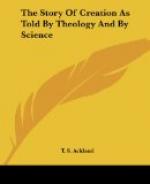Instances of all these sources of uncertainty meet us very early in Genesis. In the very first verse we have a word, [Hebrew script], which has great latitude of meaning. It is either the earth as a whole (ver. 1), or the land as distinguished from the water (ver. 10), or a particular country (ii. 11). In many cases, as in all these, the context at once determines the sense to be chosen; but there are other cases in which considerable difficulty arises. The whole question of the universality of the deluge turns, in a great degree, upon the signification which is assigned to this same word in the sixth and following chapters. In the second verse we have another word, [Hebrew script], which is capable of various interpretations. It is used throughout the Bible in the three distinct meanings of “wind,” “breath,” and “spirit.” Where we read, “And the Spirit of God moved upon the face of the waters,” the Jewish paraphrase is, “And a wind of God (i.e. a great wind) moved,” &c. Here there is nothing in the context to assist us in determining the sense to be chosen; but, as will be seen in the sequel, modern science indicates that the Jewish interpretation is untenable, and that our translation is, consequently, the correct one. As an instance of confusion of time, we may refer to ii. 19. In our translation this verse seems to place the creation of animals after that of man; but in xii. 1, the very same form is translated by the pluperfect, “Now the Lord had said unto Abram.” It ought evidently to be translated in the same way here: “And out of the ground the Lord God had formed,” &c. In ii. 5, on the other hand, the pluperfect might with advantage have given place to another form: “For the Lord God did not cause it to rain.” The phenomenon referred to appears to have been local and temporary. Had the pluperfect been omitted in one case and supplied in the other two sources of apparent difficulty would have been removed.
It is very clear, then, that there could be no approach to scientific accuracy in a narrative written in such a language as this. Such accuracy is, in fact, attainable only in proportion, as science has moulded language for its own purposes. But language is at all times an index of the general mental condition of the people who use it, and so the knowledge and the ideas of the men of these primitive times must have been extremely limited in all those directions with which we have to do. Accordingly, we find no trace of any doubt whether the information with reference to external objects which was received through the senses was in all cases to be depended on. There can be little doubt that to those early observers the sky was a solid vault, on the face of which the sun, moon, and planets moved in their appointed courses; the stars were points of light, golden studs in the azure canopy; the sun and moon were just as large as they appeared to be, and the earth was a solid immovable plane of comparatively small extent.




